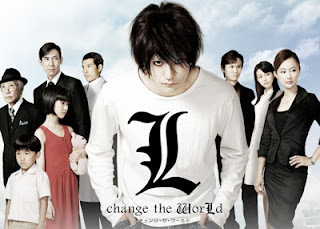
Controversy in China
posted on 2005-02-06 01:15 EST
Popular Manga Banned in Some Schools
Imitating events in the manga series Death Note, Chinese school students in the city of Shenyang have take to writing death notes. The students buy special stationary and follow instructions such as "Write the cause of death and the person's name backwards and the person will die in 40 seconds."
A middle school student told the Shenyang Night Report, "Many of my friends have Death Note. When they are tired of studying, they have fun by writing down the names of teachers they don't like."
Some Shenyang schools have banned the manga and related stationary, the newspaper called Death Note, "Poison, creating wicked hearts." Others however, including one major Chinese newspaper, feel that the ban is an over-reaction and is inappropriate. Some have suggested that overreactions such as these are what stifle creativity in China.
Kenichi Matsuyama an actor that play on three Death Note Live Action Series as L is dubbing for Jealous voice on 12th episode of death Note that titled "Love".
Shido Nakamura Ryuk's seiyuu on DN live action and anime is a famou s Kabuki actor on Japan, he ever play on Be With you , Letters From iwo jima and Fearless (with Jet Li)
s Kabuki actor on Japan, he ever play on Be With you , Letters From iwo jima and Fearless (with Jet Li)
Minggu, 03 Mei 2009
Death Note Facts
Diposting oleh Mihael Keehl di 21.17 0 komentar
Sabtu, 02 Mei 2009
L Change The World

Yay, a spin-off of the Death Note movies starring the loveable and strange detective L (Kenichi Matsuyama)! Too bad the film's really not that good, though to be honest, diehard fans of Matsuyama's popular take on L will likely not care that much. L: Change the World is neither groundbreaking nor noteworthy, and exists mainly as fan service for the people who can't get enough of the slouching, sweets-loving bishonen detective who outwitted the dastardly Light Yagami (Tatsuya Fujiwara) in those Death Note movies. Rabid fans of the blockbuster manga adaptations will probably find this to be a suitable reward for their unabated fandom. However, the uninitiated may need to take a crash course in Death Note lore. It's either that, or wonder why everyone is so excited to see a movie about a modern rock refugee with bad posture.
One final case finds L when a series of connected events converge on his doorstep. L reestablishes contact with K, a member of Wammy's House, the prodigy-raising thinktank that gave birth to L, as well as numerous other letter-named geniuses (no word if James Bond's Q is a member of the ranks). Also, former colleague F dies after discovering a terrible virus in Thailand, but sends L an odd messenger: a young boy who's immune to the virus, and just so happens to be a whiz with numbers. Finally, 12 year-old Maki (Mayuko Fukuda) shows up on L's doorstep bearing another strain of the same virus. Her father Nikaido (Shingo Tsurumi) developed the virus, but some nefarious baddies want control of it. Their goal: to change the world. The bad guys want to provoke an outbreak of this new virus - which is described as a fun combination of the flu and Ebola - so that they can eliminate the majority of the human race, ridding the planet of useless people while also preserving the environment. Oh, they may also be able to make a few bucks on the side.
Changing the world? Ridding the planet of useless people? Those sound suspiciously like things that Light Yagami would do, though this connection between the original Death Note concept and the plot of L: Change the World is never truly explored. Unlike the previous films, L is an original screenplay (a novel adaptation was released roughly one month before the film premiere), carving its own fictional niche while making a few welcome,  and satisfying nods to Death Note mythology. L is still incredibly quirky and smart, but without the original manga story as backup, the film suffers. L's charisma in the other films came not only from his quirky looks and behavior, but also from his ability to outthink and outwit everyone around him. In L: Change the World, L is presented as always ahead of the game, and there's never truly a moment where his intelligence impresses or entertains the audience. That's both a plus and a minus. The plus is it eliminates some of the heady and wordy exposition that weighed down the Death Note films. The negative is that it makes L: Change the World much less fun or surprising.
and satisfying nods to Death Note mythology. L is still incredibly quirky and smart, but without the original manga story as backup, the film suffers. L's charisma in the other films came not only from his quirky looks and behavior, but also from his ability to outthink and outwit everyone around him. In L: Change the World, L is presented as always ahead of the game, and there's never truly a moment where his intelligence impresses or entertains the audience. That's both a plus and a minus. The plus is it eliminates some of the heady and wordy exposition that weighed down the Death Note films. The negative is that it makes L: Change the World much less fun or surprising.
Not to worry, in place of L whipping his foes with his ultra-powerful brain, we get...character development! The original Death Note manga, anime, and movies were too concerned with Byzantine mindgames and convoluted plotting to deal with actual character development, so the change here is a novel one. This isn't the same "always solving crimes" L that we saw in the other films; this L has time to reflect upon his life and even his feelings, and the minor tweaks to the character are good ones. The filmmakers give L some emotional connection through his interaction with both Maki and the nameless little boy, and Kenichi Matsuyama makes the character's abundant strangeness watchable and endearing. For L fanboys (or fangirls, as is more likely) L: Change the World is enjoyable stuff, especially when you consider that the character will likely not make any more appearances except in prequels - whic h could still happen. Given the still-continuing fan love for all things Death Note, further adventures of L may already be in the works, pending the success or failure of this film.
h could still happen. Given the still-continuing fan love for all things Death Note, further adventures of L may already be in the works, pending the success or failure of this film.
Kenichi Matsuyama, Youki Kudoh, Mayuko Fukuda, Kiyotaka Nanbara, Masanobu Takashima, Shingo Tsurumi , Megumi Sato, Shunji Fujimura, Sei Hiraizumi, Renji Ishibashi, Bokuzo Masana, Yuta Kanai, Asaka Seto, Eriko Toda, Tatsuya Fujiwara
Diposting oleh Mihael Keehl di 22.52 1 komentar
Death Note 2 ~The Last Name~

When we last left Light Yagami (Tatsuya Fujiwara), he had just perpetrated the most elaborate and successful demonstration of his Death Note, the supernatural notebook that kills anyone whose name is written inside it. As a result of his clever scheming, Light was invited to join the investigation team chasing the mass murderer known as Kira - who just so happens to be Light, anonymously using the Death Note to kill scores of criminals daily. However, oddball super detective and avid sugar-lover L (Kenichi Matsuyama) truly suspects that Light is Kira, and he's not shy about letting Light know. During their initial and subsequent meetings, L basically rubs Light's face in his obvious suspicion.
However, instead of avoiding potential capture, Light embraces the chance to work side-by-side with his sweets-loving rival. Now that L and Light/Kira are working together, the stage is set for an epic battle between two insanely smart guys who like to talk a lot. It's a showdown of acrobatic mental geniuses, who use keen reasoning and elaborate mindgames to outwit their wily opponent.  Who will be the last name written in the Death Note? Will it be the megalomaniacal Light, or the wacky but honorable L? And will Death Note fans pissed at the fate of the manga characters find this new cinema version to be satisfying?
Who will be the last name written in the Death Note? Will it be the megalomaniacal Light, or the wacky but honorable L? And will Death Note fans pissed at the fate of the manga characters find this new cinema version to be satisfying?
The answer to that last question: yes and no. One portion of the Death Note fanbase won't be that happy because the fate of one character doesn't stray very far from his destiny as detailed in the manga. However, another portion of the fanbase should be tickled pink because the other character is served much better than his manga counterpart was. What does that mean to those not versed in Death Note lore? Probably nothing, though there's still some enjoyment along the way.
That is, if you can stay focused. Death Note is a very cerebral manga, and derives its thrills from mindgames, obtuse mental jousting, and layers of doublespeak that play much better on paper than on celluloid. Director Shusuke Kaneko doesn't do much to make the already wordy events of the manga more enthralling on film, and inserts plenty of wooden exposition to keep the audience tuned in - if they haven't fallen asleep. The first Death Note movie ended with the promise of L and Light's coming conflict, but because the sequel has to compress many volumes of manga into 141 minutes, much of the back-and-forth rivalry between L and Light gets excised in favor of talk, talk, and more talk. The uninitiated could get bored, and simply wonder why the two male leads wear so much eyeliner.
make the already wordy events of the manga more enthralling on film, and inserts plenty of wooden exposition to keep the audience tuned in - if they haven't fallen asleep. The first Death Note movie ended with the promise of L and Light's coming conflict, but because the sequel has to compress many volumes of manga into 141 minutes, much of the back-and-forth rivalry between L and Light gets excised in favor of talk, talk, and more talk. The uninitiated could get bored, and simply wonder why the two male leads wear so much eyeliner.
The unitiated might also be bothered by Erika Toda, who plays teenybopper popstar Misa Amane. Misa is egregiously perky and pouty, and the adorable Toda can be as annoying as she is charming. Misa enters the picture as the possessor of a second Death Note. Since she's a huge fan of Kira, she also uses the Death Note to punish criminals, and even becomes known as the "Second Kira". However, Misa is sloppy and not very smart - she's easily pinched by L, who figures that if Misa is the Second Kira, then her new boyfriend Light is the first one. It's smart thinking, but Light has his own elaborate plan built upon the Byzantine rules of the Death Note itself.
Light's plan involves handing the Death Note to a third party, Kiyomi Takada (Nana Katase), and getting her to do his dirty work for him. Kiyomi was also in the manga, but her film counterpart is actually an amalgamation of three separate characters. Still, her function is more or less the same as the manga. Basically, she's a pawn used by Light to prove his supreme smarts, and it works just as entertainingly on film as it did in the manga. Seeing Light's elaborate plans getting played out onscreen can be quite exciting, even though it basically invites whole pages of exposition to explain it all.
the Death Note to a third party, Kiyomi Takada (Nana Katase), and getting her to do his dirty work for him. Kiyomi was also in the manga, but her film counterpart is actually an amalgamation of three separate characters. Still, her function is more or less the same as the manga. Basically, she's a pawn used by Light to prove his supreme smarts, and it works just as entertainingly on film as it did in the manga. Seeing Light's elaborate plans getting played out onscreen can be quite exciting, even though it basically invites whole pages of exposition to explain it all.
Not helping matters is the acting, which ranges from effective (Kenichi Matsuyama makes a lovable L) to labored (Tatsuya Fujiwara strains a bit as Light) to wooden or overdone (most of the supporting actors). Again, director Kaneko's handling is far from imaginative. Nearly everything that happens in Death Note: The Last Name also occurred in the manga (though perhaps in a less truncated form), and Kaneko translates it to the screen in a slavish and entirely too-routine manner. The film could have used more creativity or cinematic verve, but the most creative thing that the filmmakers probably did was persuade the Red Hot Chili Peppers to lend two of their songs to the soundtrack.
The film largely succeeds based on its built-in popularity, and those who read the manga will easily get the most out of the screen adaptation. Those who didn't read the manga will likely be more distracted by the film's obvious shortcomings (direction, pacing, acting), but there's still a major positive: Death Note's hook - a supernatural notebook that allows its bearer to play God - works in any medium, and makes for intriguing, and sometimes enthralling moral discussion. Is Light correct in using the Death Note to reshape the world in his own image? Is his brand of justice worth the necessary sacrifice of innocent lives? Or is he just a megalomaniacal murderer who's so in love with himself that he thinks the end justifies the means?
Diposting oleh Mihael Keehl di 22.26 0 komentar







